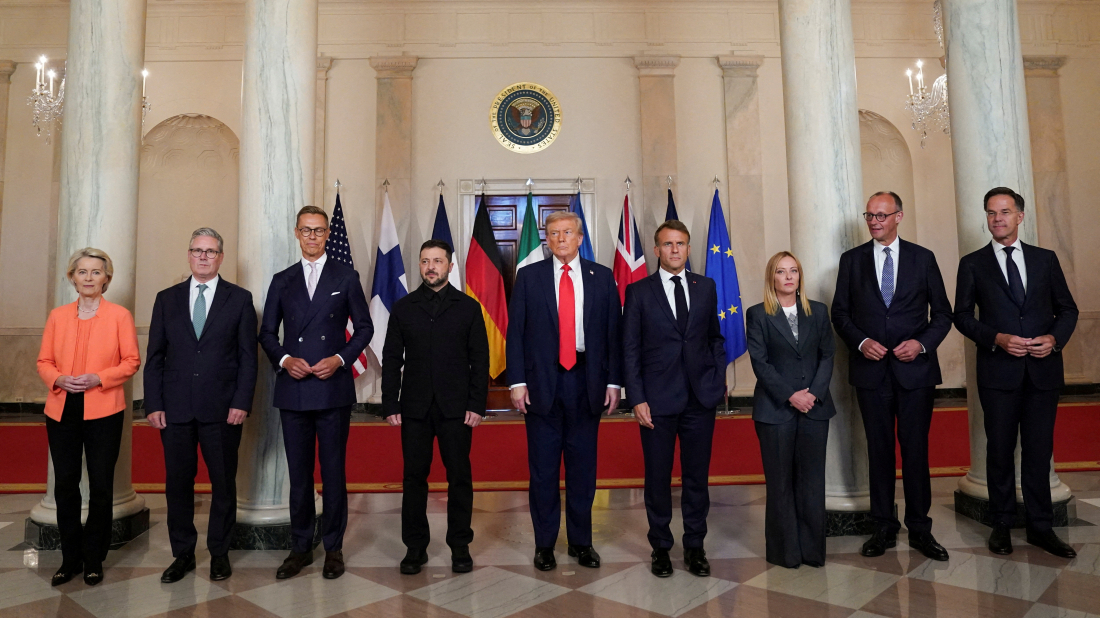Truck plows into crowd at Iran rally in Los Angeles
A U-Haul box truck has plowed into a crowd of people in Los Angeles showing support for Iranian protesters on Sunday....

The European Union’s chief sanctions envoy visited Washington on Monday with a team of experts to discuss what could become the first joint transatlantic measures against Russia since President Donald Trump returned to office.
With Moscow continuing to strike Ukrainian cities more than three weeks after Trump met Russian President Vladimir Putin at a summit in Alaska, European leaders are hoping the U.S. president is finally prepared to act on his repeated threats.
Following the heaviest air assault of the conflict to date, which ignited government buildings in Kyiv, Trump on Sunday said he was ready to move to a “second phase” of restrictions — his closest indication yet of fresh sanctions.
Although Trump entered office in January vowing to quickly end the conflict, he has repeatedly issued ultimatums for Moscow to accept a ceasefire or face tougher measures, only to withdraw before sanctions were introduced.
The EU released few details of sanctions envoy David O’Sullivan’s trip to Washington. If he secures an agreement, it would mark the first coordinated package with the U.S. since Trump’s return. Under his predecessor, Joe Biden, transatlantic sanctions were a routine feature.
Antonio Costa, president of the EU Council, confirmed that fresh sanctions were being developed in close coordination with Washington. European officials hope for better alignment after frustrations earlier this year when Trump pursued his own peace track with Putin.
The U.S. has not yet joined the EU, Britain and Canada in lowering the price cap on Russian crude oil sales to $47.60 per barrel, after global prices fell so low that the existing cap ceased to bite. Trump has instead imposed heavy tariffs on U.S. imports from India, citing New Delhi’s continued purchase of Russian oil.
On Friday, Trump warned he would end the war “or there’ll be hell to pay”. Asked by reporters on Sunday whether he was ready to implement the “second phase” of sanctions, Trump replied: “Yeah, I am.” He did not provide details, but oil prices rose by more than $1 on Monday.
At least four people, including a baby, were killed in Russia’s most extensive wave of long-range strikes so far, which set a government building ablaze in Kyiv. Further attacks on Monday targeted a nearby power station, triggering blackouts.
Ukraine’s Energy Ministry said the goal was “obvious: to cause even more hardship to the peaceful population of Ukraine, to leave homes, hospitals, kindergartens and schools without light and heat”. Russia denies targeting civilians, insisting that attacks on infrastructure are legitimate attempts to reduce Kyiv’s military capability.
Ukraine, which also carries out limited strikes on Russian territory, argues that the only way to weaken Moscow is to curb its oil revenues. The Kremlin, however, insisted on Monday that no sanctions would alter its stance.
Russia’s full-scale invasion began in February 2022 and it now controls about a fifth of Ukraine. The war, Europe’s bloodiest since the Second World War, has killed thousands of civilians and left hundreds of thousands of soldiers dead or injured on both sides.
Moscow says it will only stop if Kyiv cedes occupied territories, hands over more land, disarms permanently and renounces alliances — conditions Ukraine rejects as surrender.
“No sanctions will be able to force the Russian Federation to change the consistent position that our president has repeatedly spoken about,” Kremlin spokesman Dmitry Peskov said.
Germany’s government warned that Russia’s escalation proved “Putin does not want to negotiate — he wants to continue to create facts. And this can only be stopped by enabling Ukraine to defend itself and by ensuring he does not succeed.”
Some European officials have raised doubts about the effectiveness of sanctions unless they are broadened to limit trade with third countries. Italian Defence Minister Guido Crosetto told Il Tirreno newspaper: “We don’t buy his gas, but the rest of the world is buying it. What’s the point of sanctions if Putin has alternatives?”
U.S. President Donald Trump has ruled out ordering a mission to capture Russian President Vladimir Putin, saying he is confident the war in Ukraine can be brought to an end.
Timothée Chalamet won the Golden Globe for best male actor in a musical or comedy on Sunday for his role in Marty Supreme, beating strong competition in one of the night’s most closely watched categories.
Bob Weir, the rhythm guitarist, songwriter and co-founder of the Grateful Dead, has died at the age of 78, his family has said.
Hawaii’s Kīlauea volcano is showing increased activity, with lava flowing from two summit craters and flames, smoke and ash rising from the caldera.
China, Russia and Iran have begun a week-long joint naval exercise in South African waters, a move that comes amid strained relations between Washington and several members of the expanded BRICS bloc.
Start your day informed with AnewZ Morning Brief: here are the top news stories for the 12th of January, covering the latest developments you need to know.
A U-Haul box truck has plowed into a crowd of people in Los Angeles showing support for Iranian protesters on Sunday.
U.S. President Donald Trump says he plans to speak with billionaire Elon Musk about restoring internet access in Iran, where authorities have imposed a near-total blackout amid nationwide anti-government protests.
Hawaii’s Kīlauea volcano is showing increased activity, with lava flowing from two summit craters and flames, smoke and ash rising from the caldera.
The Arctic has become a frontline for strategic competition, NATO’s top military commander in Europe said on Sunday, as Russia and China increase their presence in the region.
You can download the AnewZ application from Play Store and the App Store.

What is your opinion on this topic?
Leave the first comment